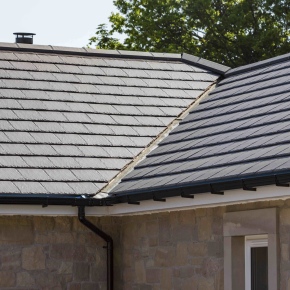
Roofing industry adapts for skills shortage
With skilled workers in short supply, new, easier to install tiling systems are an ideal solution. Richard Bishop, Category Marketing Manager for Roof at Wienerberger, looks at the market, and current trends in clay tiling.
Traditional plain tiles, pan tiles and large format clay tiles form the backbone of the British roofs cape alongside natural slate. However, skilled workers are required to use and install these tiles correctly.
With the skills shortage in full flow, interlocking tiles are being favoured as roofers can now complete the work in a more efficient way. Therefore, roofing solutions manufacturers, such as Wienerberger, is designing and producing tiles that are much simpler to install.
Although the tiling technique is easier, the finished look is just as aesthetically pleasing. Wienerberger constantly strives to achieve beautiful roofing that is easier to install and suits every need, Richard explains.
The emergence of these interlocking tiles means that the product is being specifically sought out and used by new types of installers, including builders who would usually sub contract to a roofer.
Due to growing popularity, all of Wienerberger’s ranges feature the interlock system and the simple to use product has become the introductory level to the various markets.
Clay products still have the ability to meet all required roofing regulations, whilst experienced roofers that are trained in traditional laying methods are still able to use mortar and follow the NHBC mixing guidelines, along with simple mechanical fixing techniques.
As concrete tiles have become cheaper, clay tiles have been required to adapt and progress. Clay roof tiles are easy to lay due to the interlocking mechanism, whilst still boasting the premium feel and style associated with the material.
Traditional lay roof tiles are extremely popular within the industry with the versatility of the clay meaning that the tiles can be used almost anywhere and for all architectural styles. The clay product can also be utilised to create variations that are styled on other materials, such as slate.
As there is no need for drilling, the product offers substantial cost savings and time savings through the installation process. In addition, the clay also means that the tiles will last for a lifetime, with several examples of clay-tiled pitched roofs lasting over a hundred years.
Visit Supplier's page
Latest news

18th December 2024
BMBI: October Merchant sales rally with a +7.3% month-on-month increase
The latest Builders Merchant Building Index (BMBI) report shows builders’ merchants’ value sales in October were up +1.2% compared to the same month last year.
Posted in Articles, Bathrooms & Toilets, Bricks & Blocks, Building Associations & Institutes, Building Industry News, Building Products & Structures, Building Services, Building Systems, Civil Engineering, Cladding, Concrete, Cement, Admixtures, Drainage, Drainage Services, Floors, Garden, Hand Tools, Hard Landscaping & Walkways, Health & Safety, Heating Systems, Controls and Management, Heating, Ventilation and Air Conditioning - HVAC, Information Technology, Interior Design & Construction, Interiors, Landscaping, news, Paints, Paints, Coatings & Finishes, Pipes, Pipes & Fittings, Plant, Equipment and Hire, Plumbing, Power Tools, Publications, Research & Materials Testing, Restoration & Refurbishment, Retrofit & Renovation, Site Preparation, Sustainability & Energy Efficiency, Timber Buildings and Timber Products, Walls, Waste Management & Recycling
18th December 2024
GEZE UK announce Kids' Village charity partnership
Kids’ Village is delighted to have partnered with GEZE UK as their 2025 charity of the year – find out more via the article…
Posted in Access Control & Door Entry Systems, Architectural Ironmongery, Articles, Building Industry Events, Building Industry News, Building Products & Structures, Building Services, Charity work, Doors, Facility Management & Building Services, Health & Safety, Restoration & Refurbishment, Retrofit & Renovation, Security and Fire Protection, Windows
18th December 2024
Encon Achieves 5% Club Silver Membership
The Encon Group, the leading independent distributor of building materials, is pleased to announce that it has been awarded Silver membership of The 5% Club by the 2024/25 Employer Audit Scheme.
Posted in Articles, Awards, Bricks & Blocks, Building Associations & Institutes, Building Industry Events, Building Industry News, Building Products & Structures, Building Regulations & Accreditations, Building Services, Building Systems, Civil Engineering, Cladding, Concrete, Cement, Admixtures, Facades, Hard Landscaping & Walkways, Health & Safety, Insulation, Landscaping, Plant, Equipment and Hire, Recruitment, Restoration & Refurbishment, Retrofit & Renovation, Site Preparation, Training, Walls
18th December 2024
SWA: A focus on Steel Window Association member West Leigh
Located in Charlton, South London, SWA member West Leigh was established during the Blitz, in 1943. During the destruction in London, the company helped in repairing windows and facades that had been damaged by bombings throughout the city.
Posted in Articles, Building Associations & Institutes, Building Industry News, Building Products & Structures, Building Services, Building Systems, Case Studies, Facades, Glass, Glazing, Restoration & Refurbishment, Retrofit & Renovation, Steel and Structural Frames, Walls, Windows
 Sign up:
Sign up: